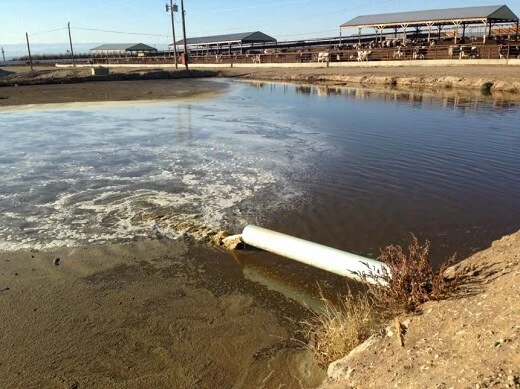
Yesterday, Judge Thomas Rice in the Eastern District of Washington published a groundbreaking 111-page opinion in favor of plaintiffs’ motion for summary judgment in the first of a series of four public health lawsuits against industrial mega-dairies in Yakima Valley, WA, CARE et al. v. Cow Palace Dairy et al. The case is on behalf of Center for Food Safety (CFS) and a local community group Community Association for the Restoration of the Environment (CARE) under the Resource Conservation and Recovery Act (RCRA), represented by The Law Offices of Charles M. Tebbutt, Public Justice, P.C., and Seattle-based firms Stritmatter Kessler Whelan and Terrell Marshall Law Group.
This case is the first of its kind to establish that manure created at an industrial animal operation (in this case, a mega-dairy), when mishandled, is a solid waste under Resource Conservation and Recovery Act (RCRA)— expanding RCRA to include manure as a solid waste for the first time. This legal approach is particularly meaningful because RCRA offers far-reaching remedies to force the industry to clean up their practices and the contamination they caused. In a rare move deciding this type of case at summary judgment, the Court set national precedent by holding the dairies liable for their manure, finding that they were operating as open dumps and endangering the public health by contaminating the local water supply with nitrates.
Specifically the Court ruled that:
- Plaintiffs had standing.
- Defendants’ manure was a solid waste under RCRA because it had no beneficial use (they created far more than they could properly use).
- The manure was leaking into groundwater, which is the Valley’s drinking water supply, and endangering public health through nitrate contamination.
- The dairy is operating in violation of RCRA’s open dumping provisions, meaning they must conform to sanitary landfill or other waste treatment standards.
- The corporate entities backing the dairy were also liable.
The Court based its opinion on the particularly egregious practices of the facility. For example, even after the fields were saturated with manure, the facility continued to dump tens of millions of gallons of additional raw sewage on its land and stored that manure in unlined pits directly above the aquifer. The dairy also installed reverse osmosis systems on its own employees’ water systems while continuing to deny that there was any pollution from the dairy, leaving the community exposed to their contaminated well water. Their own experts admitted that more likely than not, the dairy was contaminating the water supply.
The only issue left for trial on the groundwater contamination is the remedies. The court reserved Plaintiffs’ RCRA claims on environmental contamination of surface waters and whether the cow pens were sources of contamination for trial because Plaintiffs did not move for summary judgment on those issues. It is also critical to note that Judge Rice ruled on Plaintiffs motions to unseal the documents in the case. The Plaintiffs vigorously opposed Defendants’ prolific document sealing and the Court issued a strong opinion unsealing all of the documents supporting the motions for summary judgment.
This is an enormous victory for the Yakima Valley community, who have been fighting for clean water for more than two decades, and the team of attorneys supporting them. The lengthy opinion can be found here:
http://www.centerforfoodsafety.org/files/320–order-granting-in-part-msj-11415_78926.pdf
Find recent news concerning this case and non-compliance here: https://www.yakimaherald.com/news/local/deruyter-son-dairy-accused-of-not-following-federal-cleanup-order/article_0b642a8c-617e-519c-abed-4d6b34490a7e.html#commentshttp://
